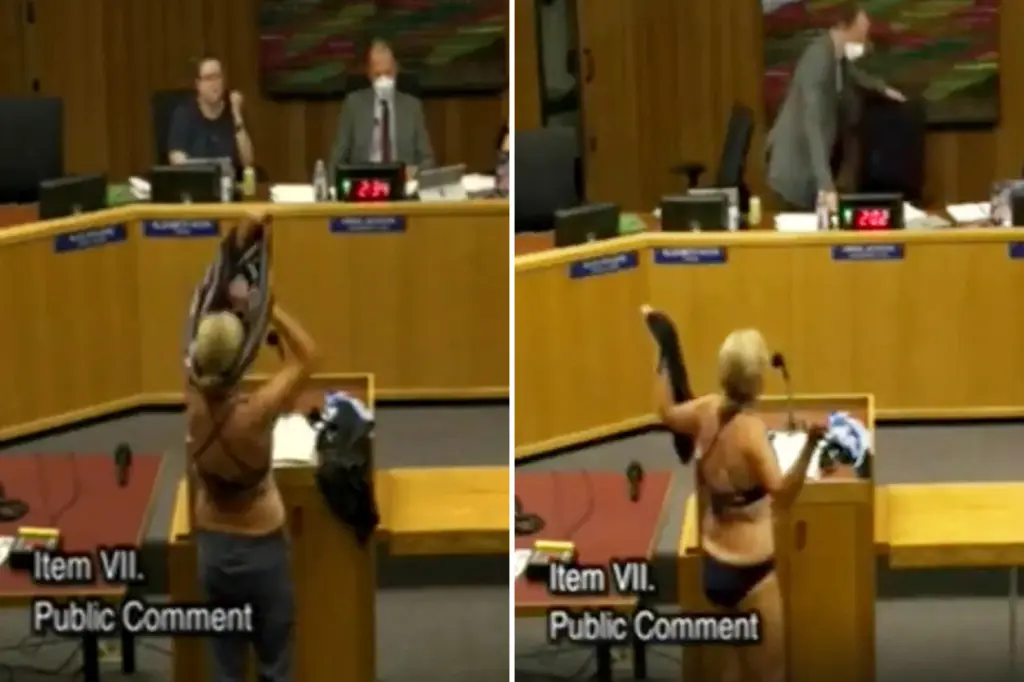California Activist’s Bold Protest Against Transgender Bathroom Policies Sparks Controversy
In a dramatic display of protest, Beth Bourne, a local women’s rights activist and Moms for Liberty chair in Yolo County, California, made headlines when she stripped down to a bikini during a Davis Joint Unified School Board meeting. Her unconventional demonstration on September 18 was intended to highlight her concerns about the district’s policies allowing transgender students to access locker rooms based on their gender identity. For three years, Bourne had been regularly attending these monthly meetings to voice her opposition to these policies, but felt compelled to take more dramatic action to draw attention to her cause. As she began her public comment, Bourne explained that she wanted to demonstrate what students experience when required to undress for PE classes, suggesting that the current policies enabling transgender students to choose facilities based on self-identification created uncomfortable situations for other students.
The school board’s reaction was swift and decisive. When Bourne began removing her clothes to reveal a bikini underneath, board members immediately attempted to interrupt her presentation. Despite Bourne’s protests that her First Amendment rights were being violated, School Board Vice President Hiram Jackson called for a recess to halt her demonstration. This tension between free expression and maintaining decorum in public meetings highlighted the emotionally charged nature of debates surrounding transgender policies in schools. After a brief five-minute recess, the meeting resumed with the board allowing Bourne to continue her comments, but when she again began to disrobe, they ordered another, longer recess of more than thirty minutes before moving on to other agenda items without returning to her concerns.
Speaking to CBS News the following day, Bourne defended her actions by drawing a parallel between the discomfort felt by board members watching her demonstration and what she believes young girls experience in school locker rooms. “If the adults don’t feel comfortable watching someone, and I’m a 50-year-old woman, how can they expect girls to feel comfortable doing that in the locker room?” she reasoned. This comparison forms the core of her argument against the district’s transgender access policies, suggesting that the reaction her demonstration provoked proved her point about privacy concerns. The incident illustrates how the debate over transgender rights in schools has evolved beyond theoretical discussions into emotionally charged confrontations that challenge traditional boundaries of public discourse.
The aftermath of Bourne’s protest revealed the serious institutional response to what board members considered inappropriate behavior. Trustee Cecilia Escamilla-Greenwald disclosed to local publication The Vanguard that police were called following the second recess, indicating the level of disruption perceived by school officials. The board member also mentioned that the superintendent would be consulting legal counsel about possible responses to such situations in the future, emphasizing that “it’s very inappropriate for anybody to be coming before the board and behaving in such a manner.” This response suggests that while public input is valued in school governance, there are expectations about how that input should be delivered, especially in forums that may include minors or be broadcast to the wider community.
This incident exists within a broader national context where policies regarding transgender students’ access to facilities have become intensely divisive. Supporters of inclusive policies argue they’re necessary to protect transgender youth from discrimination and psychological harm, while critics like Bourne contend they potentially compromise the privacy and comfort of other students. The Davis school district’s policies align with California state laws protecting transgender students’ rights, but implementation continues to face resistance from some parent groups. Organizations like Moms for Liberty, which Bourne represents locally, have become prominent voices in challenging what they characterize as progressive educational policies that they believe infringe on parental rights and traditional values regarding gender and sexuality.
The school board meeting incident demonstrates how local educational forums have become battlegrounds for broader cultural and political divisions in American society. What might once have been routine administrative discussions about school operations now frequently evolve into deeply contested debates about identity, rights, and values. Bourne’s protest, regardless of one’s position on the underlying issue, represents the escalating tactics employed by advocates on all sides of contentious social issues. As school boards nationwide navigate these complex waters, they face the challenging task of balancing community input, legal requirements, student wellbeing, and maintaining productive public discourse. The controversy in Davis highlights how educational policy decisions that affect vulnerable students can generate emotional responses that test the boundaries of civic engagement and the capacity of local democratic institutions to manage profound disagreements about how schools should address gender identity.









